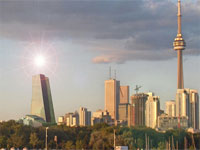Detroit - Downtown on the Farm?
 GLOBE-Net - Over the past 50 years it is estimated Detroit has lost almost half of its population. Long known for its many vacant lots resulting from this depopulation - estimated at 40 square miles - the possible collapse of the domestic auto industry could add to that stock of non-productive real estate.
GLOBE-Net - Over the past 50 years it is estimated Detroit has lost almost half of its population. Long known for its many vacant lots resulting from this depopulation - estimated at 40 square miles - the possible collapse of the domestic auto industry could add to that stock of non-productive real estate. Enter Detroit Businessman John Hantz with plans for Hantz Farms - a concept that would convert hundreds, even thousands, of vacant parcels in the city into urban agriculture. Detroit “could become a destination for fresh, local and natural foods and become a major part of the green movement,” says Hantz.
The farm could grow everything from Christmas trees to fruits and vegetables, and include such amenities as a cider mill and possibly space for horseback riding. Blighted areas near Detroit’s Eastern Market have been suggested, but the exact boundaries of the farm would depend on whether the city is prepared to cooperate.

Land assemblage is the key issue. Hantz owns several parcels in the city, but the vast majority of the acreage he needs for his project is either owned by private parties or is tax-foreclosed land owned by the city, the county or the state. Donating the land to his project or selling it at nominal costs would be required. The payback, notes Hantz would come from increased tax revenues once the farm is up and running.
The city is home to hundreds of smaller community gardens, but the Hantz proposal is the first to envision large-scale commercial farming.

Large scale urban farming is a concept that is drawing much attention these days. An earlier GLOBE-Net Report notes that in order to accommodate another 3 billion people by the year 2050, a whole new concept of urban land use for food production will be required using cutting-edge technologies. This is where the concept of the vertical farm comes in.
As noted in the GLOBE-Net Report marshalling the investment capital and the technologies needed to create a viable (and profitable) vertical farm is every bit as complicated as securing financing and basic inputs for traditional agriculture, except the existing array of farm and crop subsidies likely would not come into play.
Adding the social equity dimension (i.e. feeding the urban poor) raises many more bottom line issues that could discourage many investors.
But Hantz, who is chief executive of Hantz Group, a network of financial services firms based in Detroit might be the one who can make it happen. His company’s motto is “Believe in all things others say can’t be done”.

